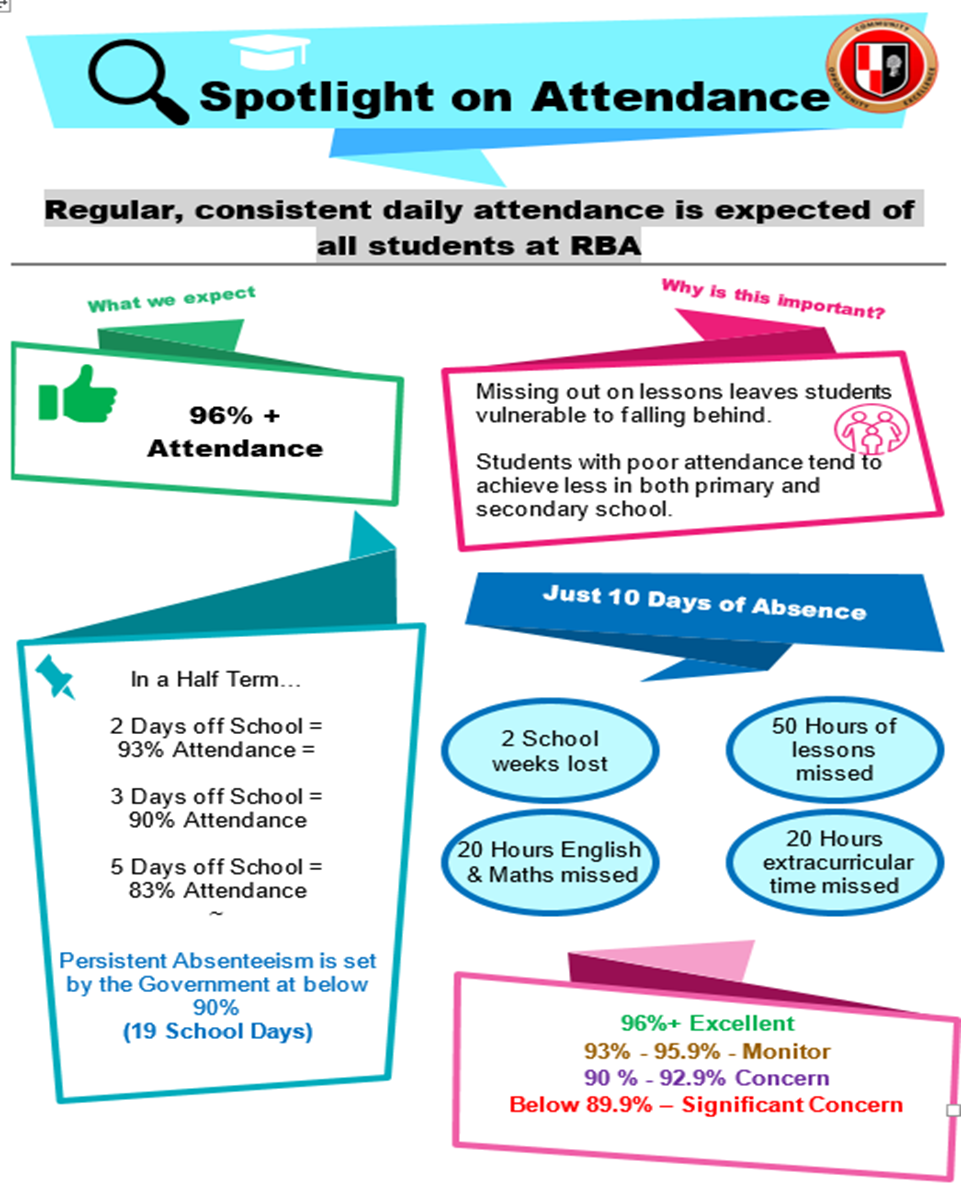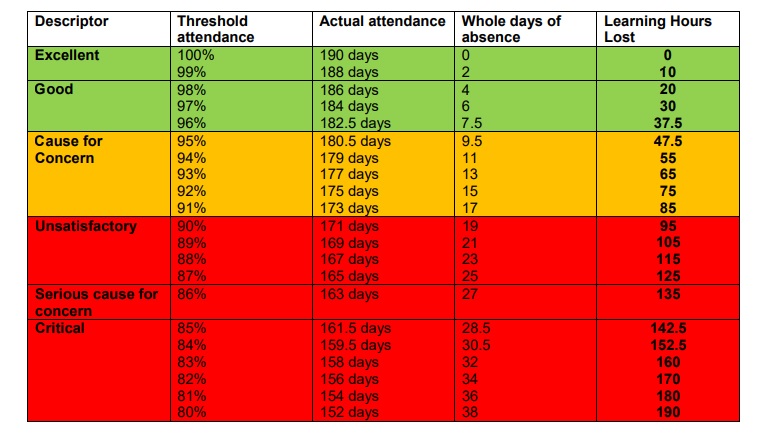School Attendance
Regular, consistent daily attendance is expected of all students at RBA. This is to ensure our outstanding provision is not missed and all students flourish from Year 5 to Year 8. It is the responsibility of the parent/family to ensure their child attends school, but RBA will work with families when barriers occur, such as anxiety or specific medical needs. See our section here for support strategies on school anxious students.
Parents/carers are responsible for:
● Ensuring that their child attends school every day on time thereby promoting the importance of excellent attendance and punctuality
● Contacting the school to report a child’s absence before 9am in the unlikely event that their child is absent. A call must be made on each subsequent day of absence, advising when their child is expected to return. Please phone the school on 01462 628800, option 1 (Nb. We do not accept “unwell” as a reason for absence. A specific reason will be required.)
| 96 - 100% |
Attendance levels are good to excellent |
| 93 - 95.9% |
Attendance levels beginning to cause concern
|
| 90 - 92.9% |
Attendance levels causing more significant concern
|
| 89.9% or lower |
Attendance decreased to an unacceptable level – below persistent absence rate – despite interventions by school staff
|
Missing out on lessons leaves children vulnerable to falling behind. Children with poor attendance tend to achieve less in both primary and secondary school. The Education (School Day and School Year) (England) Regulations 1999 require all maintained schools to open to educate their pupils for at least 190 days (380 sessions) in each school year.
| Days Absent | Attendance in one school year |
| 9.5 Days | 95% |
| 19 Days | 90% |
| 28.5 Days | 85% |
| 38 Days | 80% |
| 47.5 Days | 75% |
| 57 Days | 65% |
| 66.5 Days | 60% |
In a Half Term, it looks like this:
| Days Absent | Attendance for 6 weeks |
| 2 Days | 93% |
| 3 Days | 90% |
| 5 Days | 83% |
| 8 Days | 73% |
| 10 Days | 67% |
| 15 Days | 50% |
Why is this important
- When a child attends school on a regular basis, they take an important step towards reaching their full potential, and are given the greatest opportunity to learn new things and develop their skills.
- Children who miss school frequently can fall behind with their work and do less well in exams.
- The more time a child spends around other children, whether in the classroom or as part of a school team or club, the more chance they have of making friends and feeling included, boosting social skills, confidence and self esteem.
Points to Remember
- You can only allow your child to miss school if he or she is ill, or if you have advance permission from the school
- Absence requests will only be granted in exceptional circumstances
- You can be fined for taking your child out of school without advance permission from the school

How do I request permission for an absence?
You must submit a request to the school before you arrange for your child to have time away.
If you wish to take your child out of school during term time, you need to submit a formal request to the Head of Year via the school office. The Head of Year will then consider whether to give permission for the absence.
When will absence requests be granted?
Permission for absence will only be granted in exceptional circumstances.
The Principal will consider each absence request individually and decide whether to grant the absence.
The Principal will also decide how many days your child can be away from school if the absence is granted
|
What if I take my child on an unauthorised absence?
If you take your child out of school without advance permission (except where he or she is unwell), you can be fined or even prosecuted.
This could involve:
• A fixed penalty notice of £60 within 21 days, or £120 within 28 days
• A parenting order, education supervision order or school attendance order where your child repeatedly misses school without a good reason.
Why is it important?
Missing two weeks of school for a holiday might not seem like very much, but it can have a big effect on your child’s education.
For example, if your child misses two weeks of school every year, this adds up to more than two terms over the child’s whole time in school.
Making sure your child attends school as much as possible means:
- Your child will have the same education and opportunities as everyone else in the class
- You won’t need to worry about catching up on work, or that your child might fall behind because of missing an important lesson
Your child will miss out on activities at the start and end of term, which are often fun and a chance to develop new friendships.
Legal Framework:
Parents are responsible for making sure that their children of compulsory school age receive a suitable full-time education. This can be by regular attendance at school, at alternative provision, or otherwise (e.g. the parent can choose to educate their child at home).
A child reaches compulsory school age on or after their fifth birthday. If they turn 5 between 1 January and 31 March they are of compulsory school age on 31 March; if they turn 5 between 1 April and 31 August they are of compulsory school age on 31 August. If they turn 5 between 1 September and 31 December, then they are of compulsory school age on 31st December.
School Attendance and Absence - Guidelines
https://www.gov.uk/school-attendance-absence
Lost Hours of Learning
Going to school regularly is important for your child's future. Parents are responsible for making sure their children receive full-time education. Parents are legally responsible for making sure that children attend school.
Benefits of school attendance
Good attendance at school is not just beneficial, it’s essential. Attending school is directly linked to improved exam performance which should in turn lead to further learning opportunities and better job prospects. As well as this, going to school helps to develop:
- Friendships
- Social skills
- Team values
- Life skills
- Cultural awareness
- Career pathways
Absence from school
All schools must record details of students’ attendance and absence at school. They do this at the beginning of morning and afternoon sessions meaning that each day your child receives two half day marks.
When staff talk about attendance percentages with parents or students, it can be difficult for them to understand why there are concerns. Achieving 90% in an exam or test is a fantastic result, but if your child is at school for only 90 per cent of the school year then they will have missed 19 days - almost four whole weeks of school.

You can help prevent your child missing school by:
- having a routine from an early age and sticking it to it
- making sure your child understands the importance of good attendance and punctuality
- making sure they understand the possible implications for themselves and you as a parent if they don't attend
- taking an interest in their education - ask about school work and encourage them to get involved in school activities
- discussing any problems they may have at school and letting their teacher or principal know about anything that is causing concern
- not letting them take time off school for minor ailments or holidays during term time
To avoid disrupting your child's education, you should arrange (as far as possible), appointments and outings:
- after school hours
- at weekends
- during school holidays
